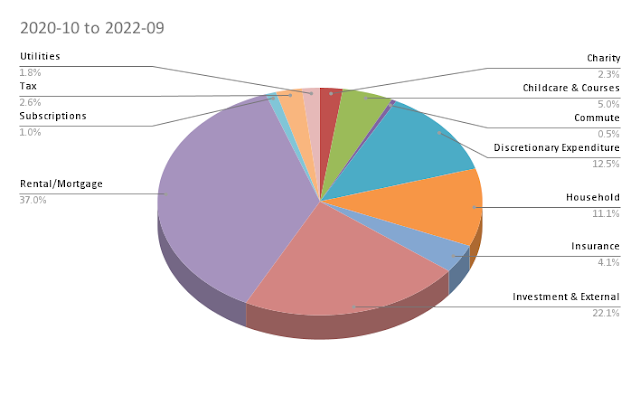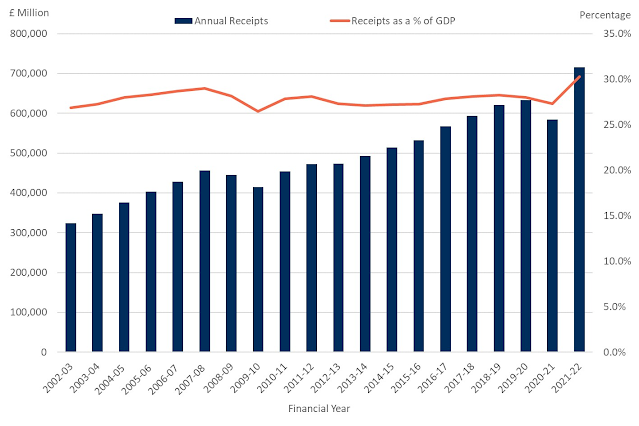Completely Unsolicited Advice to UK's Chancellor
In the next few days, UK's chancellor, Rishi Sunak, is going to present a budget, where it is widely anticipated that some taxes will be raised in order to pay for the costs the Government has incurred in 2020-21 due to covid related costs.
While I haven't studied taxation in any formal way, I think a lot about taxation, both from a taxpayer's perspective, as well as the Government's perspective. Coming out of that thinking has been a few ideas on how best to address the revenue shortcomings while also making the tax system fairer and simpler.
Let's start with basic principles. Why does a Government tax a citizen or a corporation?
- To raise revenues for Government's own spending
- To punish some sort of behaviours - i.e. inheritance tax, carbon tax etc. As an example, Inheritance tax is not aimed so much as revenue generation as it is to prevent concentration of wealth.
- To promote good behaviours - entrepreneurship, risk taking, or promoting certain sectors of the economy etc.
In doing so, there are a few taxation behaviours Governments have stuck to:
- Progressive taxation - tax someone who earns more than someone who earns less
- Fairness - tax anyone who earns, not just selectively.
(I am sure there might be more to taxation philosophy, but I doubt if there are any that would be relevant to the ideas that I plan to talk about below.)
With that in mind, let's jump into the ideas.
Supporting Tax Increases
Inheritance Tax
I broadly support Inheritance Tax. This tax ensures that the rich families don't just pass on all their wealth to their successors, who can build upon it to further enhance the wealth of the subsequent generations, leading to concentration of wealth. So, why bring it up here?
Excluding agricultural land from Inheritance tax is grossly unfair. Why should owners of agricultural land pass on their wealth without being taxed? I can understand that the need to pay off inheritance tax could end up fragmenting land parcels, but the same can be said of all other assets - businesses, companies etc.
(One can potentially find middle ground, where inheritance tax could be waived off for agricultural land that was in itself inherited. i.e. such land can't be used as a mechanism to pass of wealth by buying up the land and then giving it to their children. In turn, inheritors of land can't sell it unless they want to lose the option of their inheritance tax benefits being forfeited.)
I also find the current tax-free limit at £325,000 ridiculously low. No one with an inheritance of £325,000 can consider themselves either rich, or can entirely live off such a small sum, specially in the currently super low yield environment. It is perhaps wise to increase it to something like £1M, sufficiently large that hard working parents can leave something behind for their children, and yet not big enough to concentrate wealth.
However, I think fixing the agricultural land loophole a bigger priority.
Remittance Basis
Claiming non-domicile status to avoid taxes earned abroad is the silliest of the rules. For people who earn their wealth by earning it here, or by investing it here, we have to pay taxes, right? Then why should those who are residents of this country not pay taxes on monies earned abroad either through work or through investments? UK already has double taxation treaties with most countries, so for those who are truly impacted from having to work across two locations, it would be a good way to optimise their taxes.
Remittance basis allows enough people not to pay taxes in this country, while still living here, making it unfair on those who genuinely work here, contribute to the local economy, both through work, taxes and through consumption.
Taxes on Gains
One of the most talked about matters is that capital gains and dividends should be taxed the same as income, as the beneficiaries of such income are mostly the well-off and the rich and why should they pay lower taxes than those who earn their money by working?
Dividends
The biggest reason for differential tax treatment of dividends is double taxation. i.e. The corporations paying the dividend to you are also paying corporate taxes on the income they make. Imagine a company making £100. First, it pays £19 in corporate taxes, and only the remaining £81 is eligible for dividend distribution. Furthermore, at current peak dividend tax rate of 38.5%, the receiver would only receive £50.625, which is only about half the income generated by the corporation in the first place.
The trouble is that very few fall into the 38.5% tax band. Most of those who gain dividends can either tax it at 0%, or 7% (upto £50K total income). Perhaps the best way to settle this is to remove the other bands and convert all dividend taxes at a 30% flat rate. Even at 30%, the richest of the rich would pay 43.3% earned by the corporate entity, which is incredibly close to the top 45% marginal tax rate enjoyed on income.
Capital Gains
The argument for differential treatment of capital gains is a lot weaker. After all, capital itself is not being taxed, so why should any gains not be taxed at income tax rates? I broadly agree that capital gains should be taxed very similar to income tax rates. However, there are 3 caveats:
- To encourage long term holding of assets, indexation benefits should be allowed for those who hold an asset for long period (as an example 3 years or more) i.e. the purchase price of the asset should allowed to be inflated by the rate of inflation, thereby increasing the purchase price and decreasing taxes. The net effect of it is that an investor is not being taxed for just matching inflation, but would be taxed on any incomes made over and above inflation. Such a rule was in place in India for many years and largely works both in terms of fairness and in terms of progressive taxation.
- If capital gains are taxed at income tax rates, then, any capital losses gained should be allowed to be offset against income. Presently, capital losses can only be used to offset capital gains and this seems fair as capital gains are taxed lower. However, if both income and capital gains are taxed uniformly, then a tax payer must be allowed to offset losses against income.
- If capital gains are to be taxed at the same rate as income, why aren't costs associated to capital gains, such as interest not be deductible? Again, not letting such costs be deductible can be argued as being fair when capital gains are taxed lower. However, if it is taxed as much as income, then why not allow costs to be deductible. Note that if instead of investing on your own name, if you invested as a corporate entity, you can enjoy such deductions even today. So the argument is to let the same treatment be accorded to individuals too.
Spread Betting
While we are on capital gains, the idea of not taxing spread betting as capital gains is just plain stupid. There is just no reasoning for this except to leave a loophole for some savvy investors to make use of.
Encouraging Tax Simplification
Tapers should go
Tapers are stupid. Tapers make no sense whatsoever. For instance the taper to remove the standard tax free allowance kicks in at £100K and removes the tax-free allowance by £1 for every £2 earned. This means that the person earning between £100K and £125K pays 60% marginal tax (40% higher tax rate + 40% of 50% of the allowance that is being tapered away). This means that the person who makes £125K is paying a higher tax rate on their last £25K than the person making £225K pays on their last £25K. That is grossly unfair, beyond any explanation.
I understand that it seems somewhat unfair for someone earning £100K to be getting the tax-free allowance. However, the person earning thus has to anyway pay a relatively high marginal tax rate on any further incomes. You don't like that they are only paying 40% and you want to increase it? Sure, then instead of taper, why not introduce the advance tax rate bracket at £100K? At least that way it would be a progressive tax rate rather than what it is today.
Similar arguments can be made about the pension allowance tapers, which the Chancellor moved to a higher tax slab last year. I would argue, however, that we are much better off, abolishing tapers altogether.
Summary
As you can note, the recommendations in this post are largely towards increasing the tax base and taxable amounts, while removing some of the inconsistencies and complexities of the system. If all of these are implemented, it would surely increase the tax base for HMRC and would leave the society in a fairer place.
However, I suspect that Chancellor might just take the easier route, like many of his predecessors - whereby he would just choose to increase some tax rates while largely leaving loopholes and unfairness in the system - leaving a bad taste among those who shall be hit by increased tax slabs.






Comments